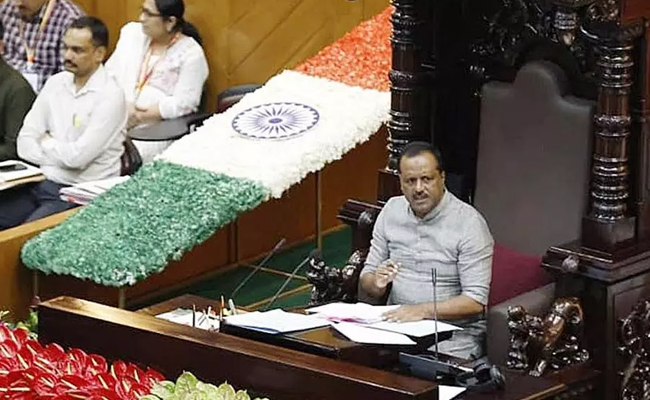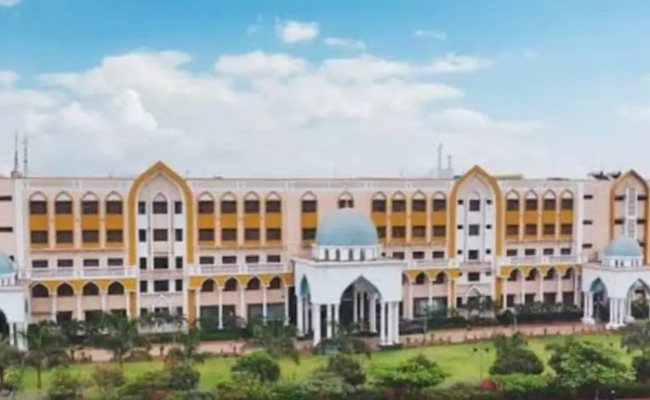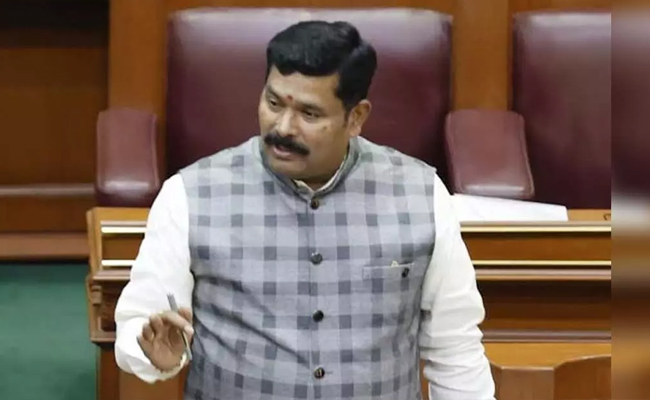Belagavi, Dec 13: Leader of Opposition R Ashoka on Wednesday alleged complete deterioration of law and order situation in Karnataka, and asked whether the Congress government was "dead or alive".
Making a preliminary submission before the Chair in the Legislative Assembly, seeking permission to move an adjournment motion on the law and order issue, he touched upon various incidents and accused the government of either inaction or failure in handling them.
"After Congress came to power in Karnataka, in the last four months, there has been an increase in cases. Is there law and order in Karnataka? Is the government dead or alive, I'm unable to understand," Ashoka, a former Deputy Chief Minister, said.
"Under this government, 43,412 cases have been registered, about 60 dacoity, 718 burglary, 12,642 robbery, 1,349 riot cases, 6,226 causing harm related cases, 1,211 POCSO cases, 809 caste related atrocities cases, 216 rape related cases, 8,043 cyber crime, among other cases -- a total of 43,412 cases have been registered, and till September-end 117 murder cases have been registered," he alleged.
Pointing at Lawyers' strike following alleged police assault on an advocate in Chikkamagaluru, Ashoka said after the Military, police are considered to be the next disciplined force and they never indulge in any kind of protest or strike, but in this case police too had staged a protest.
"But the government kept silent with their eyes shut and did not do anything. Even when police protested the Congress government remained silent. They did not intervene and hold negotiations," he alleged.
Also referring to incidents with communal overtones in Shivamogga with one involving posters of Tipu Sultan, and the Home Minister terming it as a minor incident, Ashoka said, "why curfew was imposed if it was a minor incident? There were reports of those linked to the Popular Front of India behind the incident."
He also highlighted alleged attacks on BJP and Hindu activists in Bhadravati, Belagavi, and Udupi among other several places, and also spoke about the recent incident where a woman was allegedly assaulted, paraded naked and tied to an electric pole in a village in Belagavi, which had shocked the state.
There are also reports of an incident about a Superintendent of Police's high-handedness against protesting farmers, he said, adding, "is there no one to ask in this government? Is the government alive or dead? If alive, they should have taken action against the SP and also against the police who staged the protest."
This government boasts of having the support of 136 MLAs, but they don't take any action, Ashoka said, adding, the law and order situation in Karnataka has completely deteriorated; certain incidents (like parading of a women naked) taking place in Belagavi when the legislature session is under way here --- "we have to bow our head in shame."
Earlier, Home Minister G Parameshwara objected to Ashoka raising the issue under adjournment motion, pointing out that the issue of law and order cannot be taken up for discussion under the section.
Speaker Khader too stated that the law and order issue cannot be taken up for discussion under adjournment motion and he would allow the issue to be raised in some other format under a different rule.
However, Ashoka insisted that the Chair should hear his preliminary submission and then decide whether to allow discussion under adjournment motion or not. "Earlier too there have been instances where a law and order issue has been raised under adjournment motion...the chair has the right to convert the discussion under some other rule, based on my preliminary submission."
Later, after hearing Ashoka's preliminary submission, Speaker Khader said he will give an opportunity for discussion on the issue under some other rule in a couple of days, as law and order issues cannot be raised under adjournment motion.
Let the Truth be known. If you read VB and like VB, please be a VB Supporter and Help us deliver the Truth to one and all.
Belagavi: Speaker U.T. Khader on Friday warned that members who disrupt Assembly proceedings by talking in their seats during debates will be made to sit in the House for an entire day as a disciplinary measure.
The warning came after the Question Hour, when Deputy Leader of the Opposition Arvind Bellad was permitted to initiate a discussion on the development of North Karnataka.
At this point, expelled BJP MLA Basanagouda Patil Yatnal objected, stating that he had been seeking a debate for the past three days but had not been given an opportunity.
ALSO READ: IndiGo board ropes in external aviation expert for flight disruption probe
Responding to the objection, Speaker Khader said Bellad had already been granted permission and assured Yatnal that he would be allowed to speak at the next opportunity. He noted that even as a serious discussion was underway, several MLAs were speaking among themselves with their microphones on, disrupting the proceedings.
Expressing displeasure over the conduct of members, Khader likened the situation to football, where players receive red, yellow, or white cards for violations. Similarly, he said, the Assembly issues warning cards to members who disturb the House. If they fail to correct themselves despite repeated warnings, they would be required to remain seated in the Assembly hall for a full day as punishment, he stated.





